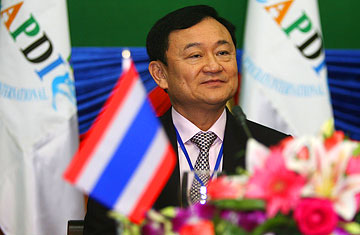
Thailand's former Prime Minister Thaksin Shinawatra attends a conference in Phnom Penh on Sept. 19, 2011
He's gone from fugitive from justice to roving de facto ambassador in a matter of months. Thaksin Shinawatra, ousted as Prime Minister of Thailand in a 2006 coup d'état, looks set to be getting his passport back. It was revoked when he was charged with terrorism last year for allegedly inciting a violent antigovernment uprising. Now Thaksin's relatives are the government: his sister Yingluck was elected Prime Minister in July, one of his in-laws has been appointed Minister of Foreign Affairs and another the chief of the Royal Thai Police. Their efforts to rehabilitate Thaksin, who fled Thailand in 2008 after being convicted of corruption, are gathering steam with talk of an amnesty or a royal pardon. But clearing Thaksin could cloud the uneasy peace that has settled over Thailand since July's election.
The election of Yingluck, a businesswoman with no prior political experience, is testament to Thaksin's resilient popularity with a majority of Thailand's voters, and in particular the rural poor who benefited from his policies aimed at reducing economic disparities when he served as Prime Minister from 2001 to '06. But Thaksin's authoritarian personality and alleged corruption also antagonized many in the urban middle class, the royalist establishment and the military that deposed him in a bloodless coup. The remnants of his political machine organized mass protests against subsequent military-backed governments in 2009 and '10. The country never appeared more bitterly divided than in May 2010 when 92 people were killed and buildings set ablaze as the army dispersed protesters — many of whom were calling for Thaksin's return — who had occupied central Bangkok for two months.
While Thaksin's opponents have accepted the election of his sister, they still don't accept him. They have warned that attempts to nullify his corruption conviction and take him back to Thailand could reignite national conflict. "History might repeat itself and the coup will happen once again," Prasong Soonsiri, a former national security official and Thaksin opponent told the Nation, an English-language newspaper in Bangkok, this week. Minister of Foreign Affairs Surapong Tovichakchaikul, however, told reporters this week on the sidelines of the General Assembly session at the U.N. in New York City that Thaksin's conviction for selling government land to his wife was politically motivated. Terrorism and other charges still pending against the former Prime Minister were also the work of political enemies, he said. For that reason the government was looking into giving Thaksin back his passport, adding that the former Prime Minister had helped improve strained relations between Thailand and Cambodia during a visit to Phnom Penh earlier this month. Nonetheless, Surapong insisted Thaksin was playing no role from afar in running Thailand. "There is no involvement of former Prime Minister Thaksin at all in determining the policies of the government," Surapong said.
Opponents, however, found that hard to believe when news leaked this month that Thaksin had led a meeting of Yingluck's Cabinet by using Skype, the Internet-videophone program. "Thailand now has two government leaders. The first one [Thaksin] is the real Prime Minister and the second is a puppet," said Jurin Laksanavisit, the whip for the opposition Democrat Party. Jurin added that the Democrats were looking into whether the Skype call had violated Thai law. Yingluck said Thaksin was not running the government, but simply exchanging ideas with ministers.
Perhaps the most controversial of those ideas has been seeking a royal pardon for Thaksin from King Bhumibol Adulyadej, the 83-year-old constitutional monarch. Traditionally, the King only grants pardons to those who have admitted wrongdoing and served at least part of their prison sentence. Thaksin has done neither. Several ministers, however, have insisted a petition requesting the pardon will eventually be sent to the royal household. Thaksin's opponents have criticized the move as an attempt to involve the monarch in a political matter. But what matters most in Thailand is who holds the reins of political power, and for now Thaksin's relatives and supporters are firmly in control.
